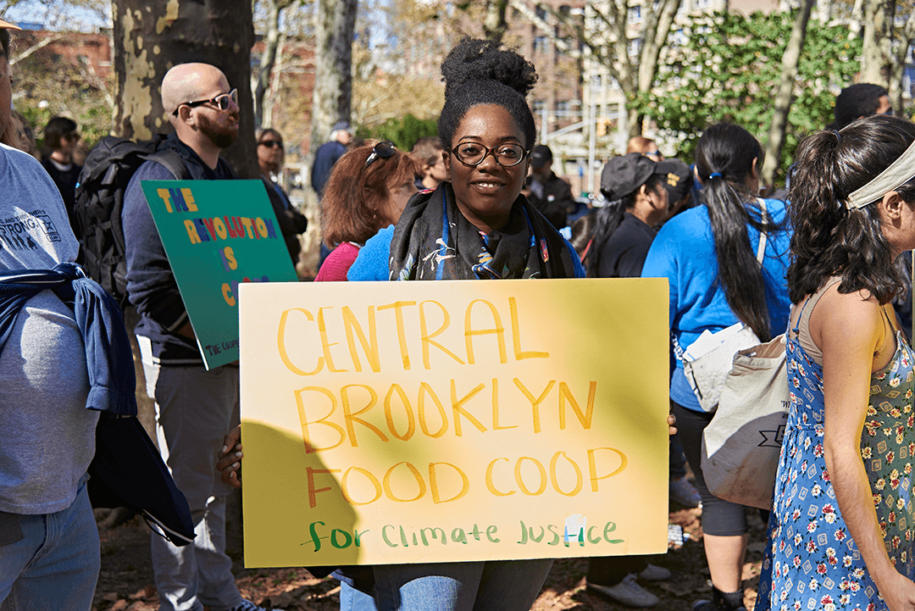Organizer, Central Brooklyn Food Co-op
How did you get into this work?

In 2013 I was living in Flatbush, slogging my way through being underpaid and underemployed in various parts of the food industry, sad that the only way I could afford to shop or eat at some of the nicer places I worked was through employee discounts. I discovered the Flatbush Farm Share CSA and it kick-started my journey to committing myself to food justice work. Prior to actually reading anything about the Flatbush Farm Share, I’d (rightfully) assumed that community supported agriculture was the domain of well-off white people in the suburbs. But that particular CSA was built on a sliding-scale model, and suddenly I was eating all these new vegetables and developing a much sunnier outlook on life thanks to all of the nutrients flooding my system. And the bestpart was the community! It was wonderful to go pick up my veggies every week with the same people and being involved in the core group helped to ground me when so many other areas of my life were in flux.
Fast forward two years and I’d moved to Bed-Stuy and taking a train to my former CSA pick-up site seemed kind of impractical. I joined the Greene Hill Food Co-Op and because I have to take everything to its logical conclusion, I got so involved that I became a staff member! And then it was through that job, thinking about my academic focus (I’m also getting my Masters in Food Studies at NYU), and what kind of effect I wanted to make on my community that led me to the job organizing with Central Brooklyn Food Co-op.
What does ‘solidarity economy’ mean to you?
A solidarity economy is one in which individuals or groups are building solid networks of support amongst each other regardless of whether or not offering that support is specifically beneficial to them. Our capitalist society looooves to encourage and reward people who are only in it for themselves. I like to think we are taking back some of that power by valuing mutual support and sharing of resources.
What are the biggest challenges you face in this work?
Cultural perceptions of and lived experience with “alternative food systems” are a big challenge to be up against. I’ve already admitted that I was hesitant to join a CSA because I thought it wasn’t “for me,” and I one hundred percent thought that about joining a food coop. I held onto these attitudes as little as five years ago – and I also want to add that I didn’t come up with these ideas out of nowhere; they were based on my very real experience of being a black American on a limited budget who often felt shut out of the pearly gates of “good, fresh, healthy food.” But it doesn’t have to be that way! People of color and other marginalized groups have been organizing cooperatively, both formally (banks/financial institutions) and informally (child-rearing), for generations.
Why do you think it is important for cooperatives to help other cooperatives?
Because according to Cooperative Principle #6, we have to! All joking aside, a cooperative cannot exist in a vacuum. For example, you can have the most perfectly-run and harmonious cooperative grocery store in the world and it won’t matter if you’re sourcing all of your products from multinational corporations and huge conventional farms, or if your staff isn’t being paid a living wage. By creating cooperative networks all along the supply chain and across different industries and sectors, you build a strong system of people who share your values and change can be created much more effectively.
What is your ‘theory of change’?
This is probably more of a life philosophy and less a theory, but – Always start with the big picture, no matter how rosy and optimistic, and work backwards from there. I feel like we are living in a moment where we have the opportunity to bust systems of oppression wide open and a “but that’s always the way it’s been done before!” attitude is the enemy of us all.
Where can we find more information about the work you are doing in the future?
Visit our website. Follow us on Facebook!
What is the best way for people to get involved and support your work?
We welcome any and everyone who wants to get involved with CBFC but are also working to center the voices and leadership of Black folks in Central Brooklyn (which we are defining as Bed-Stuy and Crown Heights), epecially low- to moderate-income long term residents.

